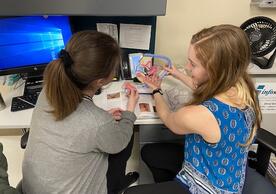
The Yale School of Nursing (YSN) midwifery program, established in 1956, is the oldest in the country and offers students integration into a variety of midwifery practices alongside YSN faculty.
With practices based at Yale New Haven Hospital (YNHH), the Women’s Center at YNHH (WCYNHH), the YNHH Vidone Birth Center, the Cornell Scott-Hill Health Clinic (SCHHC), and Yale Midwifery in Westport, midwifery students can experience diverse populations and learn what it is like to work in a birth center, a hospital, and everything in between.
Patient-centered care is what distinguishes midwifery. This means that midwives are involved with patients throughout their pregnancy, during birth, and through postpartum care. A 2018 PLoS ONE study coauthored by Holly Powell Kennedy, PhD, CNM, FACNM, FAAN, the Helen Varney Professor of Midwifery, found that states in the U.S. with high midwifery integration into regional health systems had better birth outcomes and lower rates of maternal mortality.
Yet there remains a disconnect between the known value of a midwife and the utilization of these talented practitioners. In 2017 the American College of Nurse-Midwives (ACNM)noted that only 9.1% of U.S. births were attended by certified nurse midwives (CNM). To increase midwife utilization and see increased positive outcomes for mothers and babies, it is necessary to educate the general population about these highly trained clinicians and to remove practice, financial, and other barriers. While midwives are stereotypically associated with home births, most CNMs practice in a clinical setting. According to 2017 data from the ACNM, 94.1% of CNM-attended births in the U.S. were in hospitals while 3.2% occurred at freestanding birth centers.
Dispelling Midwifery Misconceptions
Several myths still pervade public understanding about midwives. A common one, pointed out by Erin Morelli ’02 MSN, CNM, CLC, director of the midwifery faculty practice at YSN, is that pain medication will be withheld from laboring patients. Midwives can and do administer epidurals as necessary; access depends on whether the patient is within a hospital system or at birth center, as the latter does not have on-site access to epidurals or C-sections. A discussion around pain management is just one part of the conversation that continues throughout pregnancy between patient and midwife. “We focus on physiologic birth,” Morelli said. “Our lens is that the body is designed to do this, and our goal is to only intervene as necessary.” Interestingly, a Washington Post article noted that some women are now choosing delivery in birth centers in order to avoid hospital facilities during the COVID-19 crisis.
Patients seen by members of the YSN faculty practice have a variety of birthing options. WCYNHH, located at the York Street campus of YNHH, is staffed by both physicians and midwives and is outfitted for higher-risk pregnancies, cesarean sections, and emergency deliveries. The Vidone Birth Center at the Saint Raphael’s campus has been an option for low-risk pregnancies, allowing laboring parents freedom of movement, a birthing tub, and non-pharmacological pain-management methods. (In April, the Vidone Birth Center moved temporarily to the York Street facility, in order to consolidate COVID-19 related responses). These, plus SCHHC and Yale Midwifery in Westport, offer superb choices to the patient population and excellent training for YSN midwifery students. Students in the Certified Nurse- Midwife (CNM) and Women’s Health Nurse Practitioner (WHNP) specialties are precepted at all locations, giving students diverse, hands-on clinical experiences. For Morelli the benefit is two-fold, noting, “It’s important for us to serve the community we are educating students in.”
CSHHC is a community health clinic with multiple locations around southern Connecticut, providing a one-stop clinic for patients, regardless of insurance status. Tamika Julien, DNP, CNM, WHNP-BC, CLC, a lecturer in nursing at YSN, works out of one of the New Haven clinics. “Patients deserve access to midwifery care, especially in underserved communities,” says Julien. “An essential part of the student experience,” she added, “is the opportunity to learn in a culturally diverse setting as well as care for underserved communities.”
Since patients can come to midwives outside of pregnancy to get comprehensive gynecological care, including pap smears, contraception, STD screening, breast exams, treatment for UTIs, and menopause guidance, Ash Draper ’16 MSN, CNM, a midwife at CWHM, believes midwives must be prepared to treat patients in every sector and stage of life. Before returning to New Haven, Draper worked in rural upstate New York and Vermont. She has seen patients from teenagers to women through pregnancy, and those with insecure housing and complex medical issues. “No matter what background you come from, midwifery care is going to center you in your health,” she said.
Read full magazine here.
